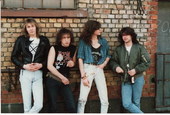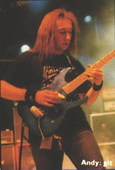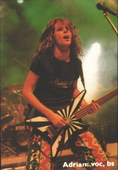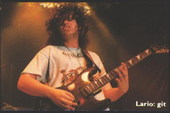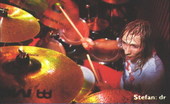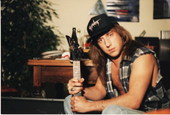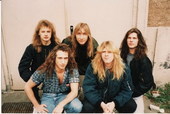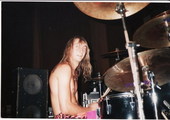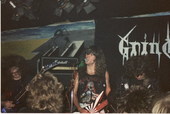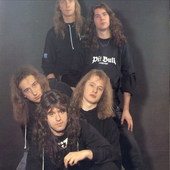Grinder
We Were An Original Band
20.01.2012
Архив интервью | Русская версияGermany’s Grinder were among the most mysterious bands for a very long time. Its albums were very popular throughout Russia in the early 90s, but information on the band itself was nowhere to be found. A brief mentioning in the excellent book “Germany Rocks!” by Igor Grachev was the only source of data that this country’s thrash metal fans had to live with. Luckily, we managed to find Grinder guitarist Andy Ergun in social networks, and he was kind enough to provide comprehensive answers to all our questions on the history of this great band.
How did you start to listen to heavy metal music and play guitar?
It was a very long time ago. I was maybe seven or eight years old. It was 1975 or 1976 when I heard Elvis Presley for the first time. That’s how I got into guitar playing. I was only a small child but it made me curious about more guitarists so later on I listened to Kiss and AC/DC – that’s how I started to listen to heavy metal. After that I discovered Motorhead and Iron Maiden. Iron Maiden became my favorite band for a long time. In the early 1980s I heard the first Metallica and Slayer albums so I became a fan of speed and thrash metal. That’s why I decided to learn to play guitar when I was 11 – that was in 1981. I started playing guitar because of AC/DC and Kiss and later I wanted to do speed metal stuff like Slayer and Metallica.
What can you say about the metal scene in Frankfurt in the 80’s? I know just a few bands such as Tankard and Exumer…
They were the only ones. (laughs) Actually the metal scene in Frankfurt was a very vital one. It was a good scene. We had plenty of bands, we also had a favorite bar where everybody was meeting each other – it was called “The Speakeasy”, and we had a lot of fun. There were lots of bands practicing and trying to get a deal with a record company, but actually the only ones who succeeded were Tankard, Grinder and later on Bohse Onkelz, but this is not real metal. So the scene was very vital, as I said, but it was not that big like in the western part of Germany where Kreator and Blind Guardian and everybody came from. In the western part of Germany the metal scene was much bigger. In addition, there was a big scene around Munich.
Why did you take the name Grinder? I guess it came from a Judas Priest song…
Exactly! That was the idea of our first drummer Schelko, we called him Shell Shock, and he had the idea to name this band Grinder because he liked that song very much.
What can you say about the early line up of Grinder? On the first album it was Adrian Hahn (vocals, bass), Lario Teklic (guitar) and Stefan Arnold (drums) and you, but were there any other musicians who used to play in Grinder in the early days?
Yes, of course. The original line-up was only Adrian, Lario and Shell Shock. Shell Shock was our first drummer and later on he became our drum roadie. When I joined the band, I guess it was 1986 or 1987 – I’m not sure, we found out that our drummer cannot keep up with us, so we were looking for a new one and we had two or three different guys and later we met Stefan – he came from the band called Wallop from the neighboring city called Offenbach. We met him and it matched. (Stefan Arnold is now the drummer in Grave Digger – ed.)
Did you hear at that time Wallop’s album “Metallic Alps”?
No, I‘ve never listened to this album. I still don’t know the music of Wallop. I was glad that Stefan joined the band at that time. He is an excellent drummer and it was just a perfect circle we made because Lario was the main songwriter, he had a perfect instinct and feeling for harmony, and Adrian was an interesting singer because at that time he was not only shouting. And I was more into details, I would be thinking about the bridge from the regular song to the refrain, I was thinking about those parts like intros and something like that.
So you were responsible for composition…
Together with Lario. Lario always invented the main theme, he was the main songwriter and I just supported him.
It’s very sad to know that Lario died but I didn’t find any information about his death. Can you tell me what happened to him?
He committed suicide. He had severe drug problems in the end, and he eventually took that decision to kill himself. He dropped out from sixth floor and died, it happened ten years ago or something. Unfortunately he was one of my best friends. Now he is buried in his hometown of Split in Croatia.
Let’s speak for a while about your first demo called “Scared To Death” (1985)…
At that time I wasn’t in the band. The demo tape was only done by Adrian, Lario and Shell Shock. By the time we did the second demo – “Sirens”, the black one (1987) – I was already in Grinder, and that was the first work of the band to which I could contribute. I really don’t have any idea about the first demo. I just listened to it once and it was OK for that time.
You know, nowadays you can find everything on the Internet. If any record exists on Earth, you can find it on the Internet, but I couldn’t find this demo.
I don’t know. Maybe Grinder wasn’t that popular so there are not many fans who can take this work, make it digital and upload it on the YouTube or whatever.
What can you say about the second demo “Sirens”? Was it well received by fans and press? Did it help you to get a contract with the label?
The responses were very good but it didn’t help us to get a contract. We sent it to a lot of record companies, but at that time thrash metal like Kreator or Destruction was very popular in Germany, and nobody wanted to listen to some kind of more melodic speed metal. But somehow the manager of Helloween (Limb Schnoor – ed.) got this tape from Stefan and he gave it to Kalle Trapp who produced our first album “Dawn For The Living” (1988). Kalle Trapp also tried to find a label for us. He had a friend, his name was Charlie Rinne and this guy was the owner of No Remorse Records. Kalle said, “OK, if I don’t find any label that is gonna produce you, I will pay you by myself because I think this demo tape is good.” He convinced his friend from No Remorse Records to sign Grinder. That’s how we got a record contract.
What can you say about this label No Remorse Records? Is it this label from Greece which exists nowadays?
No, no, no. It was a label located in Gelsenkirchen. This label also released the first album of Blind Guardian, Gelsenkirchen is the hometown of Blind Guardian. This band couldn’t find a record label either, and this producer (Kalle Trapp) convinced his friend again to sign Blind Guardian. At that time it was good to have a label but now I can say it wasn’t really professional. It was just a guy who wanted to try to make some money on music but there was no marketing behind it – only small advertisement in Metal Hammer and Rock Hard and that’s it.
What can you say about Kalle Trapp as a person and a producer? Do you think he is the right person to produce thrash metal bands?
Not for metal music. He is a really good producer, we learned very much from him because it was our first experience anyway, but for heavy metal or for thrash metal music I think he is too conservative. He is not into really hard sounds and stuff like that. For example, when we came there to play, he said, “Get out some distortion from your guitars”. I said, “Come on, we are doing heavy metal and not country music, so I need a distorted guitar.” He said, “No, make it only half distorted”. I was like, “Really?” You can hear it, for example, in the song “Dead End” from the second album. When the song starts you only hear the guitar and it’s not really high distorted, there is no big distortion in there. But he was a really detailed guy. He was really pushing Stefan, he was always sitting with a metronome clock and he was checking if Stefan is still in the beat. And if there a minimum mismatch Stefan had to repeat the whole song.
Let’s speak for a while about your first album “Dawn For The Living”. The title track shows your negative attitude towards fascism but you also mentioned communists in there. Do you think both these ideologies have something in common?
I’m not a politician. Fascism was made to suppress people and it’s a sick ideology. I’m not too familiar with communism, maybe it was good as a basic idea, but it didn’t work out. I think for the people it doesn’t matter if the system was fascist or communist – they were suffering a lot from oppression. All kinds of restricting ideologies are not good for the people – this is my opinion. Today I really welcome all these changes in the world like in the Arab countries, where they try to bring in more democracy so that people can live in a freer way.
Do you remember the song from your third album “Nothing Is Sacred” (1991) called “NME”? What is the message behind this song?
The message is the same - ideology makes people narrow-minded, you are like looking through a tunnel. For instance, in communist countries everybody was saying that Americans are evil, and in the Western world everybody told us that communists are evil. In the Western part of Germany at that time everybody told us that communists are oppressing the people and they are suffering, and in the communist countries they said, “Beware, capitalism is a very dangerous way of living, it’s brutal, and people don’t care about each other”. Everybody was only repeating what they heard at school, what they read in some books or whatever. With “NME”, Adrian wanted to show how people are taught to hate other people even if they don’t know them personally. Do you know this movie “American History X”?
No, sorry.
This movie is about a fascist guy from the States. He killed a black guy. When he got into jail he was still a fascist, he was only repeating what his father told him – that black guys are evil, they are not really human beings. In prison he found a friend and this guy was black, this guy saved his life, and then he realized, “Hey, they are humans too!” And this is exactly the same thing. At the time of the Cold War everybody was taught to hate the other side. I didn’t know any Russian person at that time and I think many Russian didn’t know any Americans or Germans. But they said: “Oh, capitalism is evil!” And we said, “Communism is evil!” That was the only thing we knew about each other but today we know that everybody is a human being. Adrian wanted to point out this wrong way of thinking.
The last song on “Dawn For The Living” – “F.O.A.D.” - sounds more in the vein of punk or hardcore. Was it a kind of joke or did you really like this music at that time?
It was half a joke. Of course we liked some of punk music because thrash metal and punk are not too far away and a lot of thrash bands listened to punk bands. The roots of thrash metal are in punk and later on when all these bands like D.R.I. or for example S.O.D. with the album “Speak English Or Die” came out, it was thanks to punk. We decided that we don’t want to make the album too serious. On the whole, the album has critical lyrics. In the song “Sinners Exile” we claim that the church is not an honest institution. “Dawn For The Living” has critical lyrics about the Second World War. The song “Traitor” is about politicians who betray the people. We had only critical songs and that’s why we wanted to have an easier in the end. The title “Fuck Off And Die” may sound a little rude, but this is the song to which you can have a lot of fun. It’s the song against all these nerdish people and all these people who could not understand heavy metal, punk music, thrash metal and all this kind of hard music at that time. The guitar solo in this track was not a solo in classical punk or heavy metal way. I think it sounds a little bit funny and unconventional. We just want to have an easy end of the record and not again some very critical and gloomy song or something like that. We had the same thing on the second album with the song “Train Raid”. This one has also funny lyrics. “Fuck Off And Die” has some serious lyrics and attitude but “Train Raid” is just a funny song. It was supposed to be a funny rock’n’roll song. There were no classical rock’n’roll songs in heavy metal at that time, and we just wanted to have our own fun punk song. We just made these lyrics about a funny cartoon character called “Lucky Luke”. It was a very popular cartoon in Germany, I think it came from France or something. In this cartoon there’s a guy – he is a cowboy, he is always smoking a cigarette, talking to his horse and his horse can talk to him. And there are those gangsters called The Dalton Brothers. It’s just a song about this cartoon how they try again for a couple of hundreds times to rob some train. But they always fail.
Let’s speak about the song called “Frenzied Hatred” from the first album.
(Laughs)
Is it a story about a serial killer?
Hmmmm, yes and no. Actually I was 16 or 17 years old and at that time everybody has some issues because you’re growing up, you’re already a teenager, but not yet an adult. At that time I had some troubles with my father. I just wrote this song to get rid off my hatred against my father. The lyrics themselves are a kind of fantasy. There is no true story behind it. Frenzied hatred means extreme hatred, right? That what I wanted to say at that time. Somebody was talking to me about my father, and I got really upset, I said: “I don’t wanna talk about him”. I felt suppressed very much at that time by my dad. We had no real communication with each other, only arguments, arguments, arguments. I was really disappointed, stressed and everything about him.
Why did you decide to continue that story on the second and the third albums?
After we made this song on the first album, Adrian liked the idea to have a kind of a story which is going on through all of our albums. He said that “Frenzied Hatred” is a perfect start because it really, as you said, sounds like a song about a serial killer even though I just wrote it about the hate I felt for my father. So we made the second song – “The Blade Is Back”, and on the third album we had the third part – “Dear Mr. Sinister”. You can also see it reflected on the album cover of “Nothing Sacred”, where you see this axe and a house in the background. This was Adrian’s idea.
What can you say about the lyrics for “Dear Mr. Sinister”? As far as I understand, this song shows us a killer who can’t kill anymore and he feels regret about it.
Honestly I didn’t check the lyrics for this song, I only know that it was Adrian’s idea and there is no real background behind it. Other songs do have some backgrounds in the reality and only this song a just a fantasy like Jack The Ripper and stuff like that. I think if we had done do a fourth album Adrian would have continued with this story. Apparently he just wanted to make it more thrilling, so that everybody would say, “What has happened? Why is he now stopping killing?”But I think if the story had continued he would have started to kill again.
Did the band play enough shows in support of “Dawn For The Living”?
After the first album we played, I think, seven or eight dates in Germany together with Blind Guardian. That’s why I said before that the record company was not really professional, they didn’t really push us on the market because eight dates is not enough. You have to play maybe 150 times a year to support your album, to get a large audience.
Your second album “Dead End” (1989) starts with the song called “Agent Orange”. And the same year Sodom released an album with the same title.
We didn’t look at Sodom. Later on I heard that they also have the song and even the album “Agent Orange” but there is no connection, we didn’t know that at that time. It’s just a coincidence.
And both of these songs are about the Vietnam war…
Of course, Agent Orange was used in Vietnam war, and it’s the story of the song. It happened by accident. I don’t know which one song is better– I personally like our song much more than the one by Sodom, because in the one by Sodom there’s less harmony and we were putting harmony in the music, in the guitar and in the vocals. I don’t know the lyrics of Sodom’s song but I think Adrian did a really good job when he wrote these lyrics for “Agent Orange”.
In my opinion “Dead End” is a pure masterpiece and one of the brightest albums in thrash metal. One of my favorite tracks from this album is the instrumental “Why”. Do you remember what influenced you to write it?
Lario had this unfinished song since we released the demo tape “Sirens”. And for the second album we just wanted to do some instrumental. I don’t know why, maybe it was popular at that time, because Metallica, for example, had all these instrumentals like “The Call Of Ktulhu” and “Orion”. We liked this idea of having a purely instrumental song and we used Lario’s unfinished song for it. As we worked on it, we had no idea how to name this song. Everybody was thinking how we could name this song, what we wanted to express with it, and I just said, “Why does this song need a title? Let the song speak for itself.” That’s why we came up with this title “Why”. Why shall we give this song a name? Everybody should feel their own emotions or see their own pictures in their eyes when they are listening to this music. We didn’t want to give any direction by saying, for example, that this song is called “Suicide” and everybody would be thinking, “Suicide? Do the harmonies and the melody match the idea of a suicide?” I just said: “Why? Why should it have any title? Everybody should enjoy this song as he likes”.
After the release of the album the band put out the single “Just Another Scar”. What was the reason for this decision?
I think this song has some excellent harmonies and melodies, and it was in Top-30 in the Metal Hammer charts. It was on position 21. This idea came from our record company at that time. They said, “Hey, this song has a really catchy melody you can easily remember, you don’t have to listen to it three, four or five times”. Unlike some complex metal songs, this one was easy to catch. Even though this song has really serious lyrics behind it, it’s about how we damage our environment. The record company said, “Let’s try to make a single”. So we did.
Speaking about the first two albums, which one is your favorite?
The second one, this is absolutely my fave, I like this one the most. When we were recording the first album, everybody went to school or was doing military or civil service. The only guys who were working at that time were Stefan and Lario. The album was not mature enough, it was a kind of rough diamond – some nice ideas but not perfectly performed. The second album sounded to me personally much more mature because the lyrics were great, there were some really great songs, and there was good production. On the first album Adrian is screaming too much but on the second album he shows that he can really sing. That’s why my second album is my favorite album by Grinder.
You mentioned military service and I know that it was a necessary thing for every young guy in German. Can you explain what was it was like to go to the military service at that time?
I don’t know, I didn’t go to the military service, I denied it. I just said, ”No, I don’t go there”. I had to explain it to judges and I did civil service instead, helping handicapped people and old people or working in hospitals. It was a big advantage. Today I don’t have any hair but at that time I didn’t want to cut my hair for the military service. I didn’t want to go to another city because I wanted to go on with Grinder. When I did the civil service I could stay in Frankfurt. On top of that, I got more money. OK, I had to work longer – it was two years, and regular military was 1.5 years, but it didn’t matter. I decided to go to the civil service.
On the subsequent release, “The 1st EP” (1990), Grinder band started to add some new elements like funk or more hardcore to its music. What was the reason for these changes?
As I told you, Lario was the main songwriter and he had a lot of influences. He had two sisters and one of the sisters was into some kind of funk music. He just grew up with this kind of music because his sister was older than him. And I liked funk, too. At that time music business started to incorporate some new influences like hip-hop and rap music. The whole music scene was in the middle of a change, many different styles were combined, and crossover music was born out of it. We decided: “OK, we don’t like hip hop but we like the funky style”. So we integrated some funk in the opening track “Reeling On The Edge”, but I think the second and the third song are more back-to-the-roots metal.
Did your fans like these changes?
Of course they did because at that time Anthrax was very popular. Anthrax also had some serious stories and lyrics but music was kind of funny sometimes, like on the “I’m The Man” single. Everybody liked it, and our fans liked our development, too, they said, “Hey, you can keep up with some Americans bands. You’re not Anthrax, you’re not that good but it depends also of the producer”. I think in the U.S. at that time the producers were awesome and in Germany there were no really good heavy metal producers.
I must say that on this EP and on the next album you worked with a good one, Harris Jones. What can you say about him?
He also produced something by Sodom, and he is a more mature guy when it comes to record production. He has nice ideas, he is professional, he is very passionate, he is a quiet guy. He gives good ideas but he doesn’t want to change your style. As I said, Kalle Trapp told us, “No, turn out some distortion”. But our style was heavy metal so we wanted to have full distorted guitars. Harris Jones said, “Heh? What do you mean - distortion out? No, no! Let it in! I will mix it later on”. And we were like, “Oh, thank you”. He was a good guy but compared to, for example, Rick Rubin from Def Jam Records who brought up Slayer and stuff like that, there are worlds between them.
Nowadays some younger musicians say that Rick Rubin is overrated; he isn’t as good as many people think.
Probably, because today, I think, the techniques developed a lot and there are many talented people. But at that time he was a good producer. I mean, it was 20 years ago and within 20 years many things can change. I’m sure there are some younger guys who can produce much better nowadays then Rick Rubin can do. He was an old guy at that time so maybe he didn’t go on with the time.
I know that in 1990 Grinder played a show in Istanbul, Turkey, and the band was the first foreign act which did a show there. So what are your memories about that show?
We were totally surprised. There was a guy, his name was Khan. He met Lario who worked in a record store in Frankfurt at that time, and this guy said, “Hi Mr. Ergun, I want to do a concert with you in Turkey!” I was like, “Hey, come on! Forget this, this is too dangerous!” Turkey was a crazy country and I was afraid that they would take me and send me to the Turkish military. But this guy really convinced Lario, and one or two weeks later we were thinking about it and we said: “This is a big chance for open the door for heavy metal to Turkey”. Finally we agreed and Khan started to organize everything and he invited us to Istanbul. It was a really unbelievable experience. Soldiers with assault rifles, who played the role of securities at this concert, started to bang their heads, it was really unbelievable.
After the release of “The 1st EP” you changed the label from No Remorse Records to Noise Records. Did this label help you to promote the band?
I think Noise Records war a kind of semi-major label at that time in Germany. It was a popular label because they had some very interesting bands. At that time I was only interested in music and I left all this label stuff to Adrian and Stefan. I just wanted to play guitar – that’s all I wanted to do at that time, so I wasn’t into this business stuff. But what I could see was that marketing efforts changed. Compared to No Remorse Records, Noise really worked a little more for us. We were only one band from - I don’t know how many bands they had at that time, maybe 30 or 40 bands - but they invested more money in us than No Remorse did with their three or four bands.
You mixed “Nothing Is Sacred” in Sky Track Studios in Berlin and that was a pretty expensive studio. Was it the right decision?
I think it was a waste of money. We did the basic recording again with Harris Jones but if you compare the sound of “The 1st EP” and the third album, the third album sounds disgusting. There is no power, the drums sound powerless and it sounds like only one guitar is playing. We brought the CD to our favorite metal bar in Frankfurt where everybody was going at that time and we said, “Hey, come on! Put on our new CD!” And the DJ said: “Hey, is it only one guitar?” I was like, “No, there are two guitars”. And he said: “It sounds like one very thin guitar”. And I was like, “Yeah, you’re right”. I think Harris did a really bad job at that time. But also you can hear on the third album that we had lost our style. The style of Adrian’s singing was too weird and too experimental. The music and the songwriting were maybe the same. I remember Noise Records expected us to deliver a complete album within two months or something like that. So we did this album within two months and you can hear it, it’s not a good album. I really don’t like it. There are some songs, for instance, “None Of The Brighter Days”, where the music is OK but the singing is not so nice I think. Also you can hear that we had a new bass player – Andi Reihert, he came from a totally different style of heavy metal, he was listening to progressive metal, he was a big fan of Rush and Joe Satriani and this was not really matching, because Grinder comes from thrash. We wanted to do some harmonic speed metal with thrash influences and maybe some songs with snippets of funk and punk or whatever but we didn’t want to change our style and when Andi joined the band we lost our plot.
We had some conflicts in the band, too, because half of the band wanted to go faster, faster, faster. Adrian and Stefan wanted to do faster music, and Lario and me said, “No, we want to keep the harmony and the melody”. We didn’t want to get harder, we wanted to have better production, harder production but not harder songs. We had some discussions and Lario decided to leave the band. He didn’t play a note on the third album because he couldn’t get any vacation from his employer, he had to work. I played all the guitars and when he came in for the mixing, he said, “This is crap!” I said, “Yes I know, but what should I do?” I told Adrian, “Please stop singing like you’re closing your nose”. Lario was totally unsatisfied and disappointed. A few weeks or maybe after two months after this album he started to say, “I will quit”.
I guess this pressure from Noise Records resulted in the song called “Nothing Song”, right?
This is not about Noise Records, we wanted to do a song about nothing because we didn’t know anybody who recorded such song. When we practiced and composed this song we said: “Let’s do a ‘nothing song’, a song which is not a song actually”. Adrian made matching lyrics to that. OK, you can also interpret it as a kind of reaction to Noise Records but I think there is one more interesting song called “Nothing Is Sacred”, the title track. We had a long discussion: shall we record this song and shall we use this kind of lyrics. Two popular metal magazines in Germany – Metal Hammer and Rock Hard – they are very friendly regarding bands coming from the area where Blind Guardian and Sodom come from, like Dortmund, Essen and all these cities from the Western part of Germany. And for the bands from Frankfurt somewhere else it’s really hard to get any interviews, just maybe one interview a year or something. So we said, “OK, those guys sit there and just support their friends because they meet each other every day when they go out. When journalists go out, they meet the guys from Sodom because they are living in the same city and they go to the same places, to the same bars when they can listen to heavy metal music. And we are the guys from Frankfurt, 300 kilometers away, we have no chance to meet this guys to build up our personal relationships, to get more support from these magazines. That’s why we said that nothing is sacred in the music business. They just listen to our records but they don’t know us, they don’t know the amount of work behind it, about the stress we had with the change of record company and all this underground disappointment which Lario felt already at that time, which brought up some tensions and conflicts in the band. They didn’t know how hard it was for us to make this record in two months. There was no support from those magazines, that’s why we wrote that song. But we were discussing should we really do these lyrics. I said, “Yes, let’s do it! We are an original band, we don’t want to make lyrics for somebody, we make lyrics about things that are worth talking about”. So we did it and it broke our neck because after that the press hated us and we got really bad ranking.
I guess these changes in your style and tough relationship with the press led to your break-up, right?
We never had too much support from the press but after the song “Nothing Is Sacred” we didn’t get any support. They all rated our album as a poor one, and there were no more interviews. Lario was totally unsatisfied with the development of Grinder, he said, “This new bass player, his influence and his playing are not matching with our imagination of Grinder”. He didn’t want to continue because he didn’t have enough skills to play guitar, so all the songs we wrote were hard to play for him. I had to play both guitars when we recorded that album. Stefan and Adrian said that he had to practice otherwise he would not be able to stay with us. I said, “No, he doesn’t have to practice because I can play it, so we can play it live, and he is the main songwriter, so I don’t want to go on without Lario”. We were best friends at that time. I said, “If Lario leaves I will leave the band too”. And shortly after Lario left I also made the decision to quit Grinder. I tried to found my new band which got the name Rawboned a few years later, but that was not a success story. The funny thing that after Grinder broke up, Adrian and Stefan, who had wanted to play faster, formed Capricorn and it wasn’t faster and harder. We called it street rock at that time. I was totally surprised when I heard their first songs, because I expected some thrash like Destruction and that was their Motorhead style. I was like, “What the hell happened?”
I heard that you used to play with Capricorn at live shows. Is it correct?
No, I never played with Capricorn. When Lario quit Grinder, David Hofmann, the blonde guy, joined the band. And after I quit they decided to change the name from Grinder to Capricorn but they also totally changed the style because David and the other guitarist - I think the second guitarist’s name was Michael – they came from rock’n’roll or traditional heavy metal. They had guitarists who could only play traditional stuff so that’s why they did this music. We broke up a very talented band because we had discussions and conflicts about whether it should be harder or not, and then they hired the guitarist who can only play traditional heavy metal and made something totally different. I was really disappointed. I said, “Did you break up Grinder just because you wanted to do this kind of music?!” I was really disappointed and I didn’t have any contact with Adrian and Stefan for a while. Today I’m good friends with Stefan and nobody knows where Adrian is living, but at that time I was really upset. I said, “You lied to us. You said, “Harder, harder” and you didn’t follow that direction”. I wanted to keep it melodic, I wanted to make songs that are more difficult to play, I wanted to find my limits but I didn’t want to change the style. For example, do you know the new Machine Head album “Locust”? It’s a great album. If you compare “Locust” with “The Blackening”, it’s still typical Machine Head but the things they are playing are very difficult in some songs. That’s what I mean when I say “more difficult”. I didn’t want to make complicated songs but I did want to make songs that are not so easy to play for everybody.
And what about another project of Adrian with Tankard members called Nemesis? Did you have something in common with this band?
Yes, I remember – the Tankard guitarist (Axel Katzman) and drummer (Arnulf Tunn). It was just a project. Adrian sang there because the producer of this band was the owner of our rehearsal room. We were practicing in an old bunker from the Second World War and many bands were practicing in this building - us, Tankard, Bohse Onkelz, etc. Its owner had a hobby to produce music. He wanted to do this band and one day they asked me if I wanted to join the band. I only played lead guitars, I didn’t play any rhythm. Everything was already done and I had only four or five days to learn these songs, to come up with my lead guitar and that’s why it sounds not very interesting – there is no red line or no plot in the lead guitar, most of it was improvised.
I think the songs themselves are more straight-forward.
I didn’t write any song, that was Axel who did all the songs. I just learned them for three or four days. then I went to the studio and they said: “OK, you have two hours, please, record your lead guitars”. I said OK. That was just a job to get some money. There was no passion because this is not my style of music. I think Adrian did a bad job with his singing and my guitar playing was also very bad, because there was not enough time to work out any nice solos or nice lead guitar parts. It’s Tankard style of guitar playing – you can hear it. That’s it. Also Tankard asked me if I would join Tankard after I quit Grinder because they were looking for a guitar player. I rejected it because Tankard is not my style of music. I could earn some money but I didn’t want money, I just wanted to play guitar.
It would have been interesting to hear the result of your collaboration with Tankard because you could add some really interesting ideas to their music.
Maybe yes, but I think… I have to say that for me Adrian is a very good singer, I know he can sing very good and he has a unique voice. The Tankard guy is only shouting. I knew that Gerre can’t sing, he is a shouter and I just wanted to play music with a singer who can shout if there is a need to shout but who can sing clean if there is a need to sing clean. I think I couldn’t do this with Tankard. Moreover, I think their fans would not appreciate a major change in their style. I didn’t want to play punk music, it’s not my favorite style. My favorite music style is still heavy metal like we played with Grinder or like the new Machine Head album – this is the style I prefer, but not punk.
What happened after you quit Grinder? Did you play in any other band?
Yes. I was looking for members of a band to go on, so I founded the band Rawboned but it took, I think, five years until I found some suitable guys. Then we recorded our first demo but it’s not comparable to Grinder because all those guys were very inexperienced, the singer was crappy – he was a classical singer, he had a really high voice. I told him, “Come on! You can also shout, you have to learn these techniques. If you learn these techniques you will not destroy your voice”. But he didn’t believe so it was just a try. You know, I’m only a guitar player, I’m not a songwriter but I had to write all the songs, I had to tell the drummer what to play, I had to tell the singer what to sing and then he sang it in a totally different way… That was not really a band. The difference between Grinder and Rawboned is in that in the good times of the first and second album of Grinder we were all best friends. We went out every night to our favorite metal bar where we had some drinks, some beers and the next day I was playing from morning to afternoon. I was always playing with Lario to compose some new tracks and then we went to our practice room and presented our new ideas to Stefan and Adrian, we made some recordings on tape and gave them to Stefan and Adrian to take it home and to think what they want to do with it. And when I had Rawboned I had to do everything, there was no team work. But I didn’t want to be a leader. And that’s why this band didn’t really succeed. We tried different singers, different drummers but… I don’t know about the situation in Russia but in Germany you can find guitarists at any corner, but a good singer and a good drummer are really hard to find.
It’s the same here. There are probably only a few decent singers in Russia.
I don’t know how Americans can do that because they always have good singers. That’s why I quit with Rawboned, I gave up. I couldn’t find a good singer. There were many people who were already married, who had had jobs and they said, “No, I cannot come to practice at that time, I can come only twice a week”. I said, “Hey, come on! Do you want to play music or do you just want to have a hobby?” There was no passion on their side. Those people were just playing as a hobby and I wanted to make music. I said, “OK, I give up, forget it”.
Do you play guitar nowadays?
I play guitar for myself but I haven’t played in a band since 1996. For a while I was hanging out with Lario. He switched over to techno music. He was recording some techno stuff and he said, “Hey, come on Andy, let’s do some techno music!” I said, “Come on, I’m a heavy metal guy, what shall I do with techno stuff?”
Techno? You mean this dance music?
Yeah, this (imitates) ‘unts-unts-unts’. Typical techno shit. He was doing that because he said. “This is a new style of music”. He was too much into drugs, all these techno people always take pills, and I think that’s why Lario joined this scene -- he could get easily some drugs. In the Grinder times he was only drinking but everybody was drinking back then. After he quit Grinder he started to smoke weed but there was also no problem. But later he started to take this ecstasy stuff, magic mushrooms and he became more and more weird and had some psychological problems, schizophrenia and stuff like that. I think that was also the thing that made him commit suicide later on, because he was schizophrenic in the end. He was like, “Somebody is following me! Somebody wants to harm me!” And I was like, “Lario, calm down, calm down! Stop eating these fucking pills and have a beer!” But he couldn’t stop anymore. That’s why I know this techno music a little, because Lario was doing that, and I was visiting his place very often.
Do you have a day job nowadays? Can you say a few words about it?
For ten years I worked as an engineer in the field of IT, I was working on hard disk drives, but for the past three weeks I’ve been looking for a new job because my old company sold my department to the competitor, so I have to look for a new job. At the moment I’m enjoying the free time. (laughs) I will start to do some music again, but not as a full-time occupation. I know a guy who can play violin, and I believe I can learn a lot from him, because he is very good. Moreover, there is a friend of mine who also plays guitar, but not heavy metal, he is more into punk, and we want to support each other in realizing our own ideas and songs. If he needs a second guitar I will learn it and play for him so he will be able to record his stuff, and he promised me to play the second guitar for me if I do something in music.
Andy, thank you very much for your time and your answers! If you want to say something for your Russian fans please do it now.
Before I met you I didn’t know that Grinder was kind of popular in Russia. If I had known that at that time when I was playing with Grinder, I think we would have done anything to try to make at least one concert in Russia. We thought that nobody knows Grinder outside Germany. If I had a chance to play with Grinder again, if I could turn back the wheel of time, I would play in Russia instead of Istanbul. I’m really proud and it’s real honor for me that even in Russia people were listening to Grinder and loved this kind of music.
Konstantin “Hirax” Chilikin
January 5, 2012
© HeadBanger.ru
